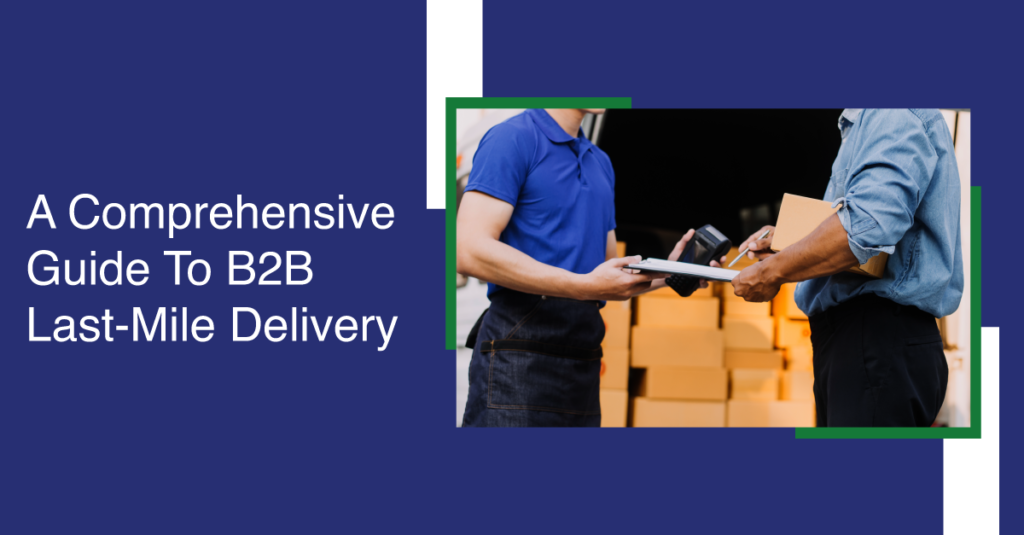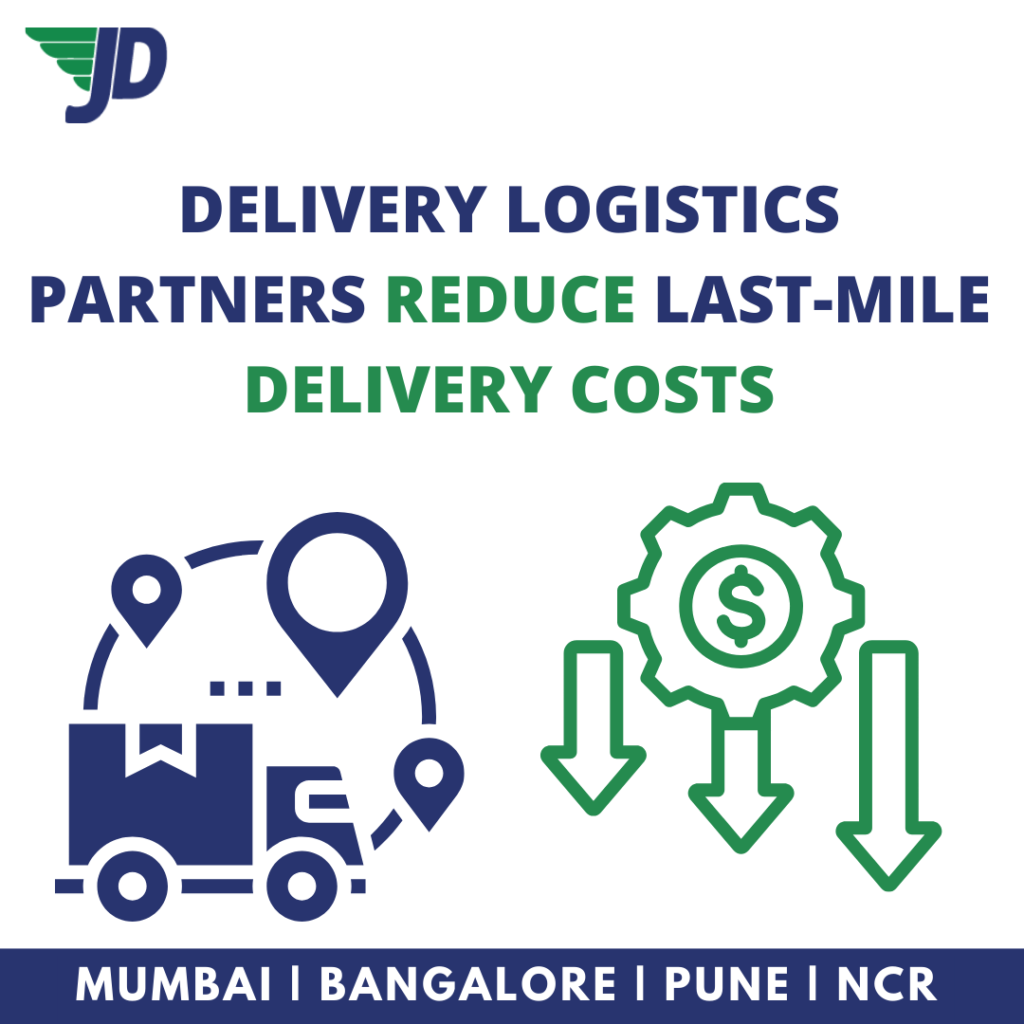In today’s era of globalisation and an ever-changing business environment, it has become essential that businesses optimise supply chains efficiently. For many businesses, a hidden hurdle lurks at the very end of the journey: last-mile delivery. During transportation, the final leg, i.e., getting products from the warehouse to the receiving business–can make or break customer satisfaction and overall efficiency.
This comprehensive guide embarks on understanding the world of B2B last-mile delivery. We’ll explore what it means to deliver “the last mile” in a business-to-business context, its unique challenges, and the strategies you can employ to optimize your deliveries, reduce costs, and keep your customers happy.
A] What Is B2B Last-Mile Delivery?
Last-mile delivery is a process of transporting goods from the final transit stop to the end business or user. In this crucial process of B2B last-mile delivery, the products are picked up from the last storage point before reaching the destination and delivered to the client\ recipient.
When discussing the role of business-to-business delivery services, it is essential to highlight the critical impact they have on meeting customer expectations. With buyers increasingly seeking fast and safe delivery of their orders, companies must place a strong emphasis on the efficiency of their delivery operations. It helps to ensure customer satisfaction and loyalty in the competitive market landscape. It helps to ensure the buyer’s satisfaction and thus enhances customer retention.
B] Challenges With Last Mile Delivery Logistics
1. Lack Of Route Optimisation
Unoptimised routes brutally hamper the supply chain journey as they disrupt the delivery timelines. Urban complexity and traffic congestion increases the challenge of last-mile deliveries and thus sellers have to face the cost surge. These challenges make the final-step of delivery expensive.
2. Use Of Outdated Delivery Technology
Lagging in adapting to advanced technologies can lead to missed opportunities and losing customers. These outdated technologies hinder vehicle tracking and lead to severe lag in route planning. As a result, these outdated technologies obstruct on-time delivery and hamper transparency. It is best to outsource to a professional last-mile delivery business who are well-adapted to the current technologies and best practices.
3. Not Many Delivery Options
Last-mile delivery logistics services offer limited delivery options to their customers. B2C delivery services have multiple options for delivering the buyer’s products, such as contactless delivery and delivery on a specific date and time. Last mile fails to offer such delivery options to its customers and thus stays behind the market trends, failing to fulfil the customer’s expectations.
4. High Delivery Costs
It is a fact that last-mile transportation takes up 41 to 53% of supply chain costs, making it one of the most expensive delivery options for businesses. Its specialised vehicle, traffic congestions and unoptimised routing upsurge the overall cost of the delivery. High delivery costs further create challenges for the growing business and reduce the business’s profitability.
5. Not Many Delivery Tracking Options
Multiple and advanced delivery tracking options create transparency as buyers can track their products using various tracking options. These features are recently gaining massive popularity, however, last-mile package delivery services lag in comparison to current market trends.
C] Top 5 Methods To Optimise B2B Last-Mile Delivery
1. Real-Time Tracking Similar To B2C Delivery
B2B last-mile delivery covers a wide range of markets and delivers a variety of products to its recipients. These products travel miles to reach the buyer’s warehouse without proper and sustainable tracking solutions. This creates a separation between the buyers and products and thus hampers the buyer’s supply chain management.
Introducing an advanced and effective real-time tracking solution to last-mile delivery greatly enhances the fleet management of the products and thus improves the supply chain. Real-time tracking systems allow the fleet managers to know the product’s exact locations without contacting any middleman. These proactive features promote transparency and help in informed business decisions.
2. GPS Apps To Optimise Routes
Unoptimised routes can indirectly cost a lot of money and contribute to delaying the delivery timelines. Using GPS-based applications to track real-time location would be a massive change in B2B delivery service. GPS-based applications utilise their servers to show the best and quickest route possible while eliminating traffic jams and other road constraints.
These applications can generate multiple possible shortest routes in seconds, eliminating the hustle of manual route planning and thus saving time. These applications may also offer delivery address downloading features for creating more tailored and customised delivery planning for further last-mile package delivery.
3. Delivery Customisation
The lack of delivery options is one of the last mile’s major challenges. It poses various difficulties for the buyers in handling and storing the delivered products. Introducing delivery customisation into last-mile delivery can add great advantage for the buyers as they can customise their delivery according to their needs and circumstances.
As B2C deliveries offer lots of customisation to their customers, adding similar delivery models into the last mile would greatly eliminate the tension of the buyers. In addition, these services help to enhance customer satisfaction and retention.
4. Install A Delivery Confirmation System
The delivery confirmation system is a tool for offering real-time updates about product delivery. It greatly enhances the transparency between buyers and sellers and eases the recipient. These confirmation tools give real-time proof of delivery and mitigate the chances of buyer-seller disputes.
Installing an advanced and efficient confirmation system greatly enhances the business’s credibility and improves customer retention. In addition, it helps in demonstrating the product’s safety and ensuring the correct deliveries. It also helps in eliminating unnecessary paperwork and enhancing the customer experience.
5. Automation In Resource Allocation
As automation technologies keep getting advanced, introducing last-mile deliveries with various automation tools for resource allocation would efficiently enhance delivery services. In this process, various automation technologies are introduced to enhance and improve the final stage delivery process.
These automation technologies help in optimising routes, tracking packages, and managing inventory. It mitigates the chances of manual mistakes and significantly reduces manual intervention. These technologies can be great additions to perishable logistics businesses as they can greatly enhance the delivery timing if incorporated with cold chain logistics.
Looking for B2B Last-Mile Delivery Services?
Partner with Us for Seamless Delivery from Warehouse to Retailer
Conclusion
Not incorporating the current technologies and trends into one’s services can severely impact the business. The same goes for last-mile delivery. The above-mentioned tips and methods can surely boost the customer experience and thus help in business profitability. However, choosing these methods according to business needs and demands is crucial for offering more concise and tailored delivery services.
Just Deliveries is a leading and renowned logistics service provider that offers a tailored delivery solution for businesses dealing with perishable food items and food service chains. We offer complete and transparent delivery visibility and ensure the safe delivery of your products with our advanced delivery management systems. To know more, contact us today!

Mansi Mahansaria
I’m Mansi Mahansaria, CEO and Founder of JustDeliveries, a B2B logistics company specializing in the food and beverage sector. With a background in Chemical Technology (ICT Mumbai), an MBA (FMS Delhi), and experience at IDFC Private Equity and Tata Group, I’ve built a plug-and-play logistics network helping F&B brands scale efficiently. I also share insights on entrepreneurship and logistics at industry and academic events.







Pingback: Delivery Logistics Partners Reduce Last-Mile Delivery Costs
“Thank you for this insightful guide on B2B last-mile delivery! The detailed breakdown of challenges and solutions is incredibly helpful for businesses looking to optimize their logistics. It’s great to see such practical advice for improving delivery efficiency. Keep up the great work!”
Pingback: How to Optimise Last-Mile Logistics by Addressing Vehicle Idling
Pingback: Why Is Last-Mile Delivery Tracking Key To E-Commerce Success?
Amazing blog!Thank you for providing this blog.
https://montagefulfillment.com/ecommerce-fulfillment/